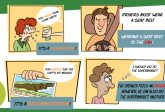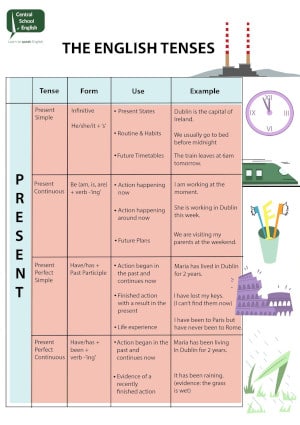Future perfect – simple and continuous
What is the future perfect tense?
Do you ever feel so confused about English tenses that you mix them up or hesitate before speaking? This is a common feeling for language learners of any language.
At our school in Dublin we try our best to help students learn tenses and English grammar in the simplest way possible and in this post I will walk you through exactly what the future perfect tense is and when we use it.
Future perfect simple
To understand the future perfect simple, we must think about time.
We know from it’s name that the future perfect simple tense has to do with…The Future, but there is more to it.
We use the future perfect when we think about time before and up to a specific point in the future.We use it to say that an action will be completed or finished before that time.
For example: By the end of the year, I will have started stage 7 of the callan method.
The point in the future we are talking about is the end of the year, in other words, 31st of December and the action that is completed is starting stage 7. It means that sometime between now and December 31st, I will finish stage 6 and start stage 7. The exact time we start doesn’t matter, we just need to know it will have happened before the end of the year sometime.
How do we form the future perfect?
Subject + will have + past participle
For example: You will have learned some new grammar by the time you finish this blog post.
Future perfect simple
We use will have + past participle when we are thinking about a completed action before a specific point in the future.
Time expressions
Hold up!
Before we go any further,it is important to note that we use this tense with time expressions as we are thinking about something done before a time in the future.
For this reason, we normally use the following words: before, by, at, in, on, by the time etc.
Take a look at the following sentences:
I will have had my breakfast before midday today.
By 5pm today, I will have gone for a walk.
At 10am tomorrow, I will already have got up.
In January 2021, we will already have celebrated New Years.
On the 18th of March, people will have already celebrated St. Patricks Day.
By the time a vaccine is available to everyone, many people will already have had covid.
Most of the prepositions use a time/day/date.
The last one, however, uses the expression by the time.
When we use by the time, we think of an event rather than a date:
For example: By the time I graduate, by the time I finish Stage 6, by the time I am married etc.
Test Yourself
Complete the following sentences, think of yourself or others
Example: By 6 o’clock tomorrow…
Answer: I will have finished my housework and gone to the park
- On Sunday…
- In the year 2030…
- By the time the earth uses all it’s resources…
- By the time I am 70 years old…
When do we use the Future perfect continuous?
We can also use the Future perfect tenses to speak about how long an action will happen up to a specific point in the future.
For example: I will have lived here for 2 years by the end of this year.
The future perfect continuous can also be used with the exact same meaning.
For example: I will have been living here for 2 years by the end of this year.
When we are speaking about time we can use both the Future perfect and Future perfect continuous and the meaning does not change.
So lets think about the future perfect continuous.
We use this tense to focus on and action that will have been in progress for a length of time before and up to a specific point in the future. The point either refers to a time or event in the future.
For example: I will have been learning English for 3 years by 2021.
This sentence means that you started studying 3 years before 2021, in other words you started in 2018.
The structure for this tense is:
will have been + verb(ing)
We can use the same time expressions we used for the future perfect.
Future perfect continuous
We use will have been + verb(ing) when we are thinking about the duration of an action up to a specific point in the future.
not a finished action.
For example: I will have been cooking dinner for 1 hour when you come home from work
Test Yourself
Vocabulary
Hesitate: to stop before doing/saying something
More to something(than meets the eye): this means that what we think or see is not the whole story, there is more information than we know
Phrasal Verbs
Walk someone through something: explain something to someone step by step
Example: I started my new job and my collegue walked me through what to do.
I hope you found this post interesting and helpful. Let me know if you liked it in the comment section.
You’ll find more English grammar tips elsewhere on our site and if you’d like information on our English courses in Dublin, please do not hesitate to contact us.
We now have online courses so you can tune in from anywhere in the world.





